inapoi la SURSE Michael Laitman – link
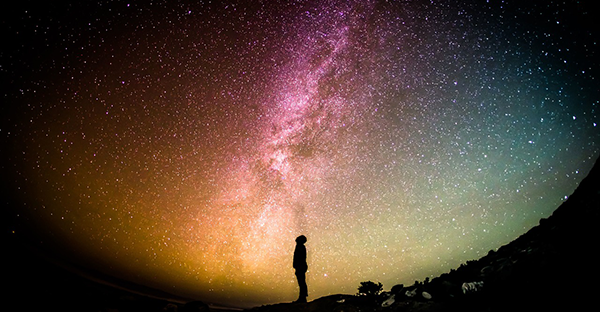
- Bold and in quotes: Original text of Baal HaSulam
- Regular: Commentaries of Rav Laitman
- lowercase italics: emphasized words
- Capitalized italics: transliteration from Hebrew
During our last conversation we talked about man and his perception of the world; how he evolves through his incarnations into a state where a question arises in him, namely, “What is the meaning of my life”? “For what sake do I live”? It is a question about the essence of life.
And this question, according to an explanation given by Baal HaSulam, awakens in us gradually over our incarnations. The evolution of man is such that every new generation that comes into the world is in fact the previous generation which reincarnated. It enters into the world with new desires and perception, allowing it to see the world in a different manner. This is also why children grasp reality more acutely than their parents.
We can also see it in all the various things that appear in today’s world. Let’s say, computers, mobile phones and other gadgets that are available to us. On the one hand, it is our generation that has developed these things, but on the other hand, we find it difficult to master them, because for us they are novelty. Children, however, come into a world where these gadgets already exist. They have a natural grasp of them and cope with them much better than we do.
It happens this way, because from incarnation to incarnation, when one leaves one’s body, ascends to the form of the soul, and descends back again, all that knowledge, and all the information one acquires in one’s previous lifetime, takes on the form of his current life’s attributes. He thus enters into this world with these new attributes, beginning a new phase, from zero, and his current zero is already at a different level than before.
In other words, he had lived in his former vessels, correcting them and filling them, accumulating knowledge and familiarity with the world and with himself. At the new stage, however, he enters into a new life, supposedly starting from zero, but with all this knowledge within him.
In each and every one of us, there is something called the “spiritual gene,” which is the chain of Reshimot (records) that exists in us, because each one of our souls are a part of the general soul of Adam ha Rishon (The First Man), which is what the Creator had created.
Every single one of us is a part of that soul. It is just that these parts have separated from one another, and they have descended into this world. The human being, by realizing these Reshimot within himself, by realizing the information that exists within himself and within his soul, must return to his previous state by himself, ascending the same steps and the same worlds, all the way back to the root of his soul.
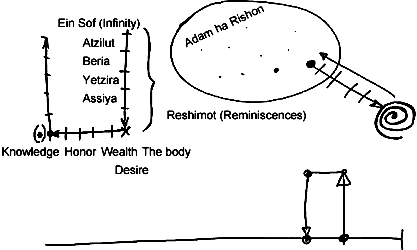
Drawing No. 1
This process includes our life, our existence above this world, the descent from the world of Ein Sof (Infinity) via five worlds into this world, and the thousands of years of our evolution within our five senses; here we determine our condition, until we reach the state where the “point in the heart” is revealed within us, which is the desire to return to our root.
From the world of Ein Sof (Infinity) , we descend in stages through what is called the worlds of Atzilut, Beria, Yetzira and Assiya, and in our return we are required to ascend up the exact same stages, instances that the soul went through on its descent. However the soul’s descent and its coming into this world are recorded within us in the form of Reshimot (reminiscences) that are unknown to us; we too, for thousands of years, have been unfamiliar with the process of our evolution in this world. In this process, our desire grows from bodily desires to money and wealth, to honor and to knowledge, until it reaches the “point in the heart,” and this takes thousands of years.
This entire process is extremely gradual and it transpires over many of our lifetimes, and like we said during our last talk, it manifests itself as a perception of reality, the reality of the world in which we live. Man thus exists and evolves in this world in a natural way. What does it mean, in a natural way? It means that even if he didn’t possess any wisdom, nor knowledge about his evolution through thousands of years, he would still evolve into the corrected state.
The human being explores his reality; he has an impulse to know. His desire is constantly demanding a higher level of understanding regarding the world in which he lives, and that pushes the person into exploring the universe until he discovers that the entire world, with all of our discoveries, brings him no satisfaction after all. At that point the individual begins to aspire for something outside of this world, for the spiritual world, for the source.
Why? Because at the source, when we were at the level of Adam ha Rishon, the spiritual level, we were filled with the Upper Light that used to fill each and every soul. Here however, in this world, we are completely devoid of it.
One’s perception of reality is such that it compels one to evolve, and what we discover today, which may seem like a major discovery, will not satisfy us tomorrow. This is because that spiritual gene that develops in the human being demands more and more filling tomorrow, more and more knowledge about our world. The person is thus constantly compelled to run and open more parts of reality, in the hope that it will bring him satisfaction.
And thus, after thousands of years of evolution, having thought that we could fill ourselves with corporal pleasures—money, honor, control and knowledge—we see that humanity is starting to become less and less satisfied with these pleasures, since they are unable to satiate the desire.
Why can’t they fill our wants? Because, evidently, if the desire remained satiated, the human being would be stuck in it, completely oblivious to anything else; the will to receive would have stopped him, leaving him in a permanent state of being filled and fulfilled.
Yet, the will to receive in itself was created in the form of a desire to be gratified, a desire to fill oneself. And just as its name indicates—a “will to receive”—it wishes to receive. It feels it is receiving and it feels pleasure while receiving. Once it fills itself, or in other words, when a pleasure enters the desire, then the point of contact between the pleasure and the desire is where the pleasure is felt.
As soon as the pleasure enters the desire, it quenches it and fills it to that degree. A desire that is quenched stops feeling the pleasure, because the pleasure is felt inside the desire. This means that the desire itself is felt. So on the one hand, there has to be an appetite, a hunger, and on the other hand, there must be pleasure. It is only when both of them meet that one feels good. And when the desire is filled, it is turned off, it goes away to the degree of the filling, up to a point where one feels that no desire even existed. This is the form of a direct reception of pleasure, a pleasure that enters a desire.
This is why we are never satiated, and we keep on searching for satisfaction. We thus produce all kinds of additional pleasures, by way of persuasion from the environment. We have a person and we have an environment. We say that the person is created such that he has Reshimot that cause him to evolve and demand newer pleasures. The environment also influences him, and constantly brings him new desires. Say, we are being persuaded that there are plenty more pleasures we don’t know about, such as a Coke®, a new mobile phone, a computer, some sort of game or trip, and so on.
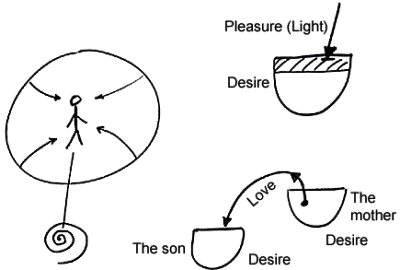
Drawing No. 2
Our general will to receive records these new offers from society, meaning, these new forms of pleasures, new ways to enjoy, and starts pursuing them. This causes us to constantly have new desires, so we can feel pleasure during that fleeting moment when our desire makes contact with the pleasure.
It thus follows that the pleasure is extinguished and we start over, needing all sorts of new things, in order to feel a little pleasure.
In other words, the human being is in a constant race to produce new desires for new pleasures, and those moments when he comes in touch with the new pleasure, are the moments he feels satisfaction, the moments when he feels alive.
This is why our life isn’t called “eternal,” because the feeling of being alive is present only during those moments of satisfaction. And here we can see that although the Upper Light—the pleasure—is ultimately a Light facing the desire, they can never exist in a state where the Light both fills the desire, and is felt residing within the desire. Following the filling, one always feels the opposite, emptiness.
In this world, we can see only one way in which someone has a permanent fulfillment, and that is a mother and her son. The mother is a will to receive toward the son, who is also a will to receive, so that if she gives him, provides him with some pleasure, and he enjoys himself, that is what really brings pleasure to the mother.
In other words, the giving causes pleasure as well. And if the pleasure comes from giving, that it isn’t dependent on what the mother herself feels, on her desire, but that it is dependent on having someone to give to, meaning on a desire outside of her—and if there is a desire outside of the mother that is willing to enjoy from her—then she always has an opportunity to enjoy herself by providing this desire with fillings and pleasures. But this condition exists only if there is love in the mother for her son, in the giver for the receiver.
In other words, if each one of us had someone we loved endlessly, then all of that someone’s desires would be for us like vessels we wish to fulfill. So if we’d care enough to fill these vessels, we’d be enjoying ourselves interminably and we would feel an endless pleasure, an eternal life.
This is why the problem of our existence can only be resolved through this type of solution, like with the mother and her son. The mother has a natural desire to love her little son and give him all the good things she has, even beyond her physical life; she feels something for him that is above the physical life, she literally feels an endless life through her son. The problem is that we, however, don’t have that feeling toward one another to begin with, which is why our lives cannot be filled with endless pleasure.
This entire reality we have been talking about, our experiences with all sorts of opportunities and possibilities for filling ourselves; with money, honor, knowledge, power and corporal pleasures—this reality where we go from incarnation to incarnation throughout our history, always coming back, trying to obtain a direct satisfaction of the desire, as with corporal pleasures—all of those continuous attempts throughout the incarnations, is for the sole purpose of reaching the conclusion that it is impossible for us to satiate ourselves with them.
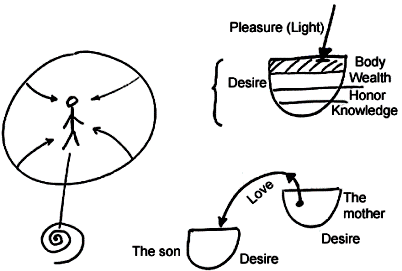
Drawing No. 3
And that is why there is a global crisis that is now beginning to be felt by humanity. Humanity has started to despair in its own evolution, and to realize that it cannot reach fulfillment, the sensation of life, through all these pleasures.
The reason why we are now discovering this, is for the purpose of revealing within ourselves, within all these big empty desires that have remained unfulfilled after thousands of years of evolution, the great void inside them—the point in the heart—the desire to be fulfilled. But it is a yearning without any direction, and one doesn’t know exactly what one wants.
There are two variables to this desire. On the one hand, this desire called the “point in the heart” indicates that all of our previous desires have been left empty. They’re hollow. In other words, they are unsuitable to receive the sensation of life inside them. This is true even in the case of someone who doesn’t have that much money, honor or knowledge, and even without food, it doesn’t matter.
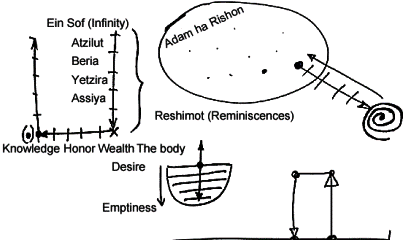
Drawing No. 4
We are talking about the decision that is already recorded in his Reshimot, inside, as a result of all the previous incarnations. In total, between himself and the influence of his environment on him, he obtains some sort of confidence, a clear resolution, that there is no use in pursuing pleasures in this world; that here in this world, he is unable to find any satisfaction for himself.
At the same time, within the point in the heart, a desire is revealed for finding the perfect pleasure, one that is above all those other pleasures, the eternal one. It is the pleasure that is effectively the beginning of the vessel, the commencement of the vessel of the soul. This is expressed, as we mentioned, by the question inside the person: “What is the meaning of my life”? the question regarding the essence of life, “For what sake do I live”?
Baal HaSulam writes in item 2 of the Introduction to the Study of the Ten Sefirot:
Indeed, if we set our hearts to answer (but) one very famous question, I am certain that all these questions and doubts (and everything else one has in life) will vanish from the horizon, and you will look unto their place to find them gone. This indignant question is a question that the whole world asks, namely, “What is the meaning of my life?” In other words, these numbered years of our life that cost us so heavily and the numerous pains and torments that we suffer for them, to complete them to the fullest, who is it that enjoys them? Even more precisely, to whom do I give delight?
Meaning, he doesn’t have an answer regarding who enjoys it and to whom the delight is given.
It is indeed true that historians have grown weary contemplating it,
All the philosophers, politicians, and all the writers and the greatest minds, as well as the ordinary person, have all been engaged in it, from the youngest to the oldest and no one has come up with an answer.
…and particularly in our generation.
Why? Because we have reached such a level of evolution, that the whole world has come up with an internal resolution, regarding the inability of this world to satisfy us. We must find meaning, after all.
No one even wishes to consider it. Yet the question stands as bitterly and as vehemently as ever. Sometimes it meets us uninvitingly, pecks at our mind and humiliates us to the ground before we find the famous ploy to flow mindlessly in the currents of life as yesterday.
Basically, up until now, the individual might have been successful in avoiding that question by engaging in all kinds of things in life, such as corporal pleasures, money, honor, control, knowledge, thinking that either he finds the filling through them, or in the very least, forgets about that question that has been embittering his life, leaving him to face that eternal question. In such a case, it would be better to forget about it altogether, if there isn’t an answer.
But nowadays—according to what we see happening with humanity, all the desperation, the general state of depression, suicides, drugs, and terrorism—this question seems to be awakening and we have no response for humanity. This means that we are actually in that same state that Baal HaSulam refers to here in the Introduction to the Study of the Ten Sefirot, the state where man is found at the gateway to spiritual evolution.
What does it mean, “spiritual evolution?” What does one need to do here in particular? We have all evolved from lifetime to lifetime throughout our history, in all types of formations, all kinds of structures of society, of slavery, there was the industrial period, the middle ages, we have been through better evolutionary times and worse… We have also evolved in a natural way, not really knowing how we evolve. And humanity keeps on living, discovering somehow, from time to time, how it needs to progress, one phase after another.
We can see it in our own lives, how every time we feel ourselves uncomfortable, unfulfilled, or worse, when we suffer, those feelings awaken us and push us into finding a better situation.
This is because, on the whole, we are all made of the will to receive, the desire to enjoy ourselves, and discovering emptiness in the will to receive, or such void that turns into real suffering and torment, awakens the will to receive to change its condition.
Just like the individual whose every movement is caused by the thought that his next situation will be better for him than his previous one—whether it be from changing mere physical postures to all kinds of thoughts, as well as inner and outer searches—so too it is with human society. The gradual discovery of the deficiency in the structure of society, and in the relationships between people, that keeps growing and revealing its negativity, pushes humanity, groups of people and nations, into transforming themselves, changing their situations, creating revolutions, going out to war, or somehow altering their situations. The result of that is progress.
We have no idea what should precisely be the next situation. We do not know what is needed for the next situation of society, and we cannot flawlessly analyze the changing situations and relationships between human beings, and within individual people. We simply do not know how to do that. It just gets revealed in a natural way, one stage after the next, the third after the second and so on.
In other words, we achieve a more advanced state in our evolution, having revealed the deficiency in the current state, and because we cannot stand it any longer, and have to do something about it, we change it.
Question: We see that the characteristics of human nature and the nature of the desire, are to want things at someone else’s expense. What is this phenomenon all about?
The will to receive was created differently. It is created in such a way that apart from feeling itself and wishing to fill itself with all that is around it, it can also be developed so that it could relate to whatever its neighbor possesses.
The still matter, for example, feels only its own attributes, and wants to hold onto its own attributes, in a permanent state. This is why it is necessary to introduce some source of energy or power to it, in order for it to transform. But all parts of the still matter itself, all the elements and components of creation, each and every one of them desires to remain in the same situation and not to change it; it is also seen in the laws of Newton, that all particles wish to move in the same velocity and remain in the same state. That is the nature of the will to receive at the still level.
At the vegetative level the will to receive changes. What does it mean that it changes? It means that it constantly discovers that its current state is bad and could be better, after which it discovers that the “better” state, that had come about through internal evolution, is now also bad and could be better, and this is how it evolves.
A vegetative type of will is already in need of the environment; it feels more of the environment, and makes all kinds of movements in its direction. It is like plants which turn toward the sun, or close at night, and so on. They need to receive something from the environment, and produce something out of themselves toward the environment. They already have some kind of a dynamic and mutual activity with the environment. We see that the world’s plants are totally connected to the earth and to the atmosphere as one single body, and not like separate forms. The more we discover about nature, and botanists can attest to this, we find out that the entire vegetative level is like a single being, a single creature that is connected to the environment. It is in a state of total equilibrium with it, and this is to the degree that if it goes out of balance, it changes its state and can even cause it to die.
Next comes the animate level, which already feels the environment in a totally different way.
It procreates differently and lives differently. It still maintains a connection with all the members of its species, as well as each and every species, but each one of them is supposedly independent in its individual movements; it has a life of its own.
And so, with the level of the speaking, the human being, we can already observe how humans need a large society, unlike plants or animals. We can also see that the human being is born in an extremely exceptional manner. It is born weak, lacking in strength, understanding, control and the ability to sustain itself. Unlike the animate level, where “a day old calf is called an ox,” because it already knows what is good and what is bad—for example, it won’t eat pasture that is bad for it—it knows exactly what it needs. All this knowledge is found in its instincts, in other words, its Reshimot (records) have its life prepared for it from the moment it is born.
The human being, however, for a long time (ten, fifteen or twenty years) exists in a state where he must constantly study and receive inputs from his environment in order to integrate into society, become part of it and know how to flow with life. This means that where the evolution of the desire is concerned, the more developed the desire, the longer it takes for it to develop, and the more it requires support from society and contact with the environment. In comparison with all the other levels in the world, man is definitely the weakest on the one hand, but he’s by far the strongest and grandest of them all after he has grown.
This leads us to the realization that if additional evolution is ahead of us, it must be initially revealed in us as a lacking, as a deficiency in our present condition—a condition in which we are unable to remain any longer. And this is precisely what we are witnessing now, in our current situation, where this will is starting to be revealed relative to everything there is in the world.
A global crisis in the family, in politics, in culture, in science and in everything on the one hand, and on the other hand, we are given an aspiration to the Upper world.
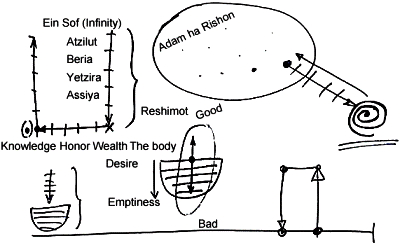
Drawing No. 5
In other words, there is something that is being revealed as bad in the present condition, and something else, that might be like an illumination from above, being revealed as something good, as something that could become a purpose for humanity. We can see, with the sudden interest in the Wisdom of Kabbalah, that this is becoming apparent. Suddenly there’s an interest in it, and everyone has somehow heard of it subconsciously, here and there, and it happens naturally, just like all the other levels of development we have gone through. For instance, we did not know that we needed to evolve from, let’s say, the middle ages to a bourgeois society, or from a bourgeois society to some other structure of society. We didn’t know. It just gradually becomes revealed, through our inability to remain in our present condition, while all at the same time, something begins to awaken toward the following condition, and is somehow starting to be seen.
It is exactly like what is happening now, where on the one hand we can see a great emptiness in the world, and on the other hand there seems to be some sort of a direction. It is just that, now, unlike in the past, there is work to be done by the individual.
Kabbalists had prepared books and concealed them for thousands of years. They guarded them and were not willing to allow the spreading and revelation of Kabbalah. Writing the books, prophets envisioned our times as the era of revelation of the wisdom. Now is when the Wisdom of Kabbalah must be revealed, and show itself to the whole world as a remedy and resolution to that known problem, that question that all of humanity is asking—“What is the meaning of my life?” “What is the substance of life?”—without which humanity is unable to continue.
Only the Wisdom of Kabbalah can provide the answer to this question.
However, a question still remains; how does one arrive there? In a natural way? Let’s say it is the Wisdom of Kabbalah, or maybe I don’t know what it is—how do we get to it after all?
Again, it must be either implanted in us, within the Reshimot (reminiscences), or perhaps I can get to it through some other sign?
Until now, we have developed exclusively through the Reshimot, as our internal gene kept pushing us constantly to evolve. But that gene pushed us toward developing in this world, chasing after all sorts of desires, enjoying all kinds of pleasures: corporal, money, honor and knowledge.
So does this internal gene become revealed for spirituality as well, making us somehow “smell,”
that apparently the next pleasure I want is no longer in this world, and that I must elevate myself and look upward?
How is it possible to bring humanity into the next stage of evolution, into the new desire that is completely different to all the previous ones? We see a circular movement in all our previous desires—instead of money comes honor, instead of honor comes politics, instead of politics comes knowledge and instead of knowledge, we return back to corporal pleasures—and so we are constantly revolving around all these kinds of pleasure.
But here we’re not talking about some pleasure that is manifesting in some physical clothing. It is, rather some sort of an internal filling. This is also the reason why we are unable to suppress this question with corporal pleasures.
When I used to be tired of my life, pursuing money, I’d run to politics. We can witness a lot of cases like this… or from politics I’d run to science, a superior and more distinguished fulfillment, and so on. But in this situation, I am unable to see any form, any image, anything at all of what I would look like in the next situation; I don’t even have any examples.
In the past we always used to have people who would lead society and say: “We must make a revolution and change everything completely, do this and that…” So there have always been people who had their vision of the future ahead. But here, in our current stage of spiritual development, one is found in a state of emptiness. The person doesn’t understand anything. He is confused, desperate, unaware of what is happening to him, and many times he even sees how he is altogether out of focus. I meet a lot of people, all of whom are asking: “For what sake do I live?,” “What is going on with me?” “What does it all depend on?” “Can this be changed?”
All of them seem somewhat baffled, all except those who are still successful at concealing the question and keep going somehow, as if existing externally. What can we do? The force of vitality to continue existing is extremely powerful in the human being.
So here certainly lies the question: how does one suddenly move from the level of down-to-earth development in this world—from situation to situation, from pleasure to pleasure, from search to search—to a search that is more internal, unknown and “spiritual,” as we refer to it? Is he being lead somehow? Is it done through the forces of nature?
Apart from nature we believe in nothing. We’ve already talked about the fact that the individual should refer to everything in life in a very realistic manner. The Wisdom of Kabbalah demands it, because “the judge has only what his eyes can see.” If I have come this far by having some forces compel me to progress, through a constant discovery of new goals for myself, this is also how I should keep moving forward. I should not rely on some abstract advice that is not found in nature.
Question: Was this method of development invented by someone, or did someone just discover that it existed?
First of all, whether it was invented or discovered is actually the same thing. When it comes to the realistic nature of things, we all evolve through the will to receive, and there are things that we discover through our experience in this world, which is what we refer to as science, wisdom. In other words, we investigate this world and everything around us; record things, probe various parts, various shapes of nature that are all around us, and we obtain an education as a result.
This is, in sum, how we construct science and we only have science to rely upon. If there are any other abstract theories out there that have not come to us out of scientific research, based on our own experience and the knowledge we have acquired through life, they are not to be relied upon. They are just the fruit of someone else’s imagination, and we have already seen how much damage and harm these abstract theories can cause humanity when it accepts them, and attempts to realize them.
On the other hand, we are always successful with the development, or with the realization of what has come to us through scientific research—these things are guaranteed. This includes medicine or technology—everything that we have and enjoy. They are based on investigations of nature, in all its laws and complexity, on the researched opportunities to apply all of that to our benefit.
The right approach is to rationally utilize and enjoy all of the achievements of humankind. However, all of these inventions whose origins are not based on facts we have discovered in nature, should not be relied upon. Because, what is it that we actually discover in nature? On the whole, we discover a relationship between a Kli (vessel), a desire, and pleasure. In other words, there is this desire, found in either one or a mixture of the still, vegetative, animate, and speaking levels. This desire, enjoyment is affected by the forces of nature at the still, vegetative, animate, or speaking levels. This is all we observe.
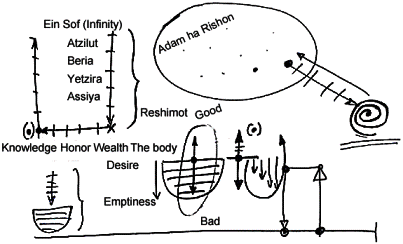
Drawing No. 6
We are, however, unaware of the fact that the relationship between us and nature is the same as the relationship between the desire and the influence on the desire. But this is, in fact, our entire investigation, and with every law we discover, we find a relationship between some desire, in whatever level it is found, and some form of influence that affects it. In essence, our science amounts to discovering of such relationship.
We also say that the soul is some sort of a desire, only that it is a desire for pleasure, for a force that is concealed from us. It is unknown and unfelt. But we have this desire, we have this impulse, we just don’t know for what. It is the point in the heart.
So basically, we must keep on investigating and treating these things only in a realistic, concrete and experimental manner. This is the reason for my question: how then, do we arrive at this spiritual development, at the Wisdom of Kabbalah and all these observations? Is it by some sort of artificial means or in a natural manner?
Question: We have been discussing the evolution of the will, but we can clearly see that it is precisely a will to receive that is evolving, that does not necessarily evolve into the question of: “What is the meaning of my life?” On the contrary, in most cases the individual ceases to want. We’ve also been discussing the fact that the evolving will to receive requires more of the environment.
The will to receive is always asking “What is the meaning of my life?” in the form of “I feel bad.” When I say “I feel bad,” “I want something new,” it means that I’m asking “What is the meaning of my life?” but in a non-decisive way. “What is the meaning of my life?” means “what is the purpose of my life?” but I don’t ask about that in particular. I just ask about it in a tiny measure, of “how will I fill myself?”
If I feel that my desire is completely empty and I do not feel that I can fill it, then the question really refers to the question: “What is the meaning of my life?” The word for “meaning” in Hebrew is “taste” or “flavor,” and it indicates that I am unable to “consume” any fillings. It is a very down-to-earth, simple and realistic question. It is not abstract, but it is asked at each and every level of my evolutionary process. I always refer to my situation as “What is the meaning of my life?” which means, “I want something new.”
And in reality we are in a constant state of development of that same question, up until the moment where one can no longer run away from it. What does it mean “can no longer run away?” It means that we are unable to see anywhere else we can go to find any type of filling.
Question: So if I go around the world looking at people whose will to receive has grown and they’re feeling empty, I don’t see them awakening to the question “What is the meaning of my life?” On the contrary, they are becoming more apathetic, they care less.
You’re right. That is because they are still unable to see the root, a source from which they can derive fulfillment. For example, if right now, I know that I wish to acquire some beautiful object, anything, to buy a car or become a scientist or go on a trip or something, then I know exactly what I need to do so that I can achieve that. I either save money to buy a tour or the car, or likewise, I dedicate myself to a scientific and knowledgeable development. Either way, I know what I need to do, in order to achieve that which I imagine as pleasure.
But here, we are approaching a state in which we have seemingly exhausted all these possibilities and are now completely empty. We are unable to see, within the framework of this world, within this world’s sphere, a source for our fulfillment. If we had seen it, it would not have been a problem—the human being is willing to invest efforts. What needs to be done? Twenty years? Fine, twenty years! This is how we operate. Perhaps it would even be possible to obtain this target immediately, and pay it up like with a mortgage? Who knows?… But the problem is that I do not see any kind of connection to it.
Question: It isn’t clear what the difference is between someone who’s had the question “What is the meaning of my life?” awaken within him, and someone who is indifferent and apathetic to life, because they are both unable to see the source…?
So what you’re asking is that we can see two types of people: There are those who are extremely bitter, but who are in a state where instead of persevering and pushing themselves, the will to receive within them does not push them forward, but only pushes them to want to suppress it. In other words, the force that pulls them downward, to feel bad, is greater than the force that pushes them forward, to get to what is good.
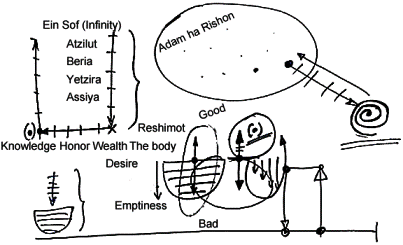
Drawing No. 7
The individual is situated in some intermediate level of development, so in here [refers to the drawing], he falls into drugs and all sorts of things, or maybe he succeeds somehow in sweetening things for himself, so he doesn’t make it to Kabbalah. He becomes desperate, falls into depression, drugs, suicide, terrorism, and all kinds of situations.
It is just like Baal HaSulam says, that the individual is still successful. Successful at what? At “(finding) the famous ploy to flow mindlessly in the currents of life as yesterday.”
He manages to somehow lower his desires into simple things like children, family, home, work and leaves it there; he doesn’t want anything else. Perhaps some sport or maybe a sort of challenge here and there, and that’s where I’ll remain. He thus heads downwards, into the previous desires, and lives in them somehow. Incidentally, our entire society and its social systems are developed incredibly well in that direction. Everything humanity produces is ultimately done unconsciously, subconsciously and consciously, in order to pull the individual back. In the end, it is also done this way through the development of the spiritual genes, in order to accelerate our development for the better by recognizing the bad much faster. By telling me: “take a plunge into all kinds of pleasures, check them out, and enjoy them,” they’re actually bringing me back faster, later on, toward the search and the right direction.
We construct our society so that it will provide us with the largest amount of pleasures available, and fill us. Out of the things we produce, who is the most successful at sales? It is he who can offer society some new pleasures that never before existed.
So basically, there are people who are still “successful” at avoiding the question about the meaning of life, and those people might need to spend one or more additional incarnations in search for pleasures of this world, meaning corporal pleasures, money, honor and knowledge. On the other hand, there are those who’s pulling force, meaning the point in the heart, is so large and developed, that it is pulling them forward. It does not allow them to run back to some pleasures, nor to disconnect from the will to receive. There are two things here: I either descend, and then search and find pleasure, or I don’t find pleasure so I suppress the empty desire, I do not feel hungry. I take a “pill” of sorts, so that I don’t feel the hunger. I didn’t manage to get food, but at least I don’t feel the hunger; and that’s like drugs, let’s say.
But our question is actually with regard to those whose point in the heart is already developed. How do they evolve further?
Is it done in a natural way or artificially? It is unlikely that it would be done artificially, as we are part of nature, after all—a will to receive against the force that acts upon it. There is nothing else in reality, and that is what we are discovering; all of nature that is found in our universe—still matter, vegetative, animate and speaking—and the force that activates nature and develops it.
So the question is basically, does this force develop nature, and does it also advance us toward a development that is beyond and above this universe, toward some dimensions we call “Superior” and “Spiritual”? That is really the question.
Question: Lately, I’ve come across some three individuals who told me very clearly that they have arrived at the question “What is the meaning of my life?” I told them: “listen, there’s this thing called Kabbalah,” but they weren’t interested at all. They don’t want to know, and they suffer and suffer…
What do you need to do? Nothing.
Question: Nothing?
Nothing. This is precisely what we have been talking about, that the individual progresses in a natural manner, which is why our circulation should only be such that we tell everyone that there is such a thing; that there is a means of development that is faster, more convenient and pleasant.
But again, it is just information, some sort of “passive advertising.” Why? Because you have to wait until the individual discovers his own desire for spirituality, so that this desire will be revealed in him such that it will pull him upward, forward, more forcefully than running into the pleasures of this world.
And he is his own judge. They’re still correctly saying: “True, we still feel emptiness, we don’t feel good, but we’re going to stay here for the time being.” Leave them. Perhaps they need to reincarnate again, and then they will come. Because we see that this is the method that forces us, and neither one of us present here, came of his own volition either, but is rather compelled to be here; and that is the best form of development.
So we will continue with this on our next class, and we’ll see how it happens.
inapoi la SURSE Michael Laitman – link
